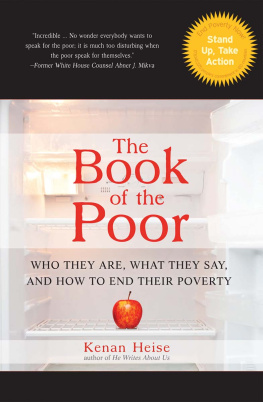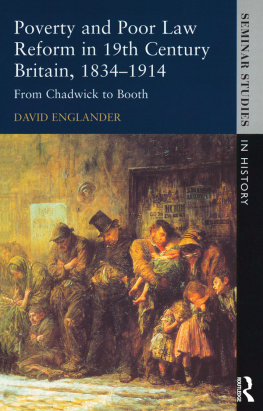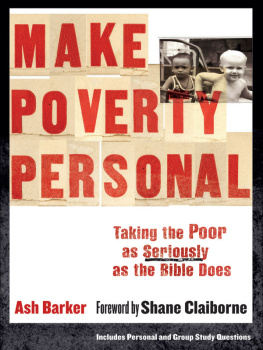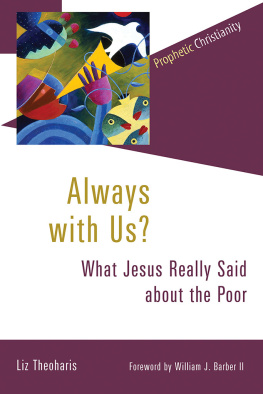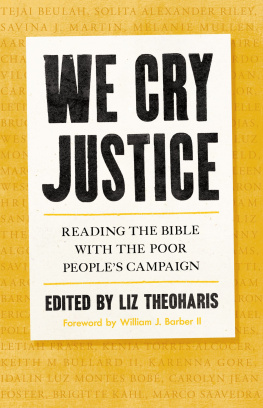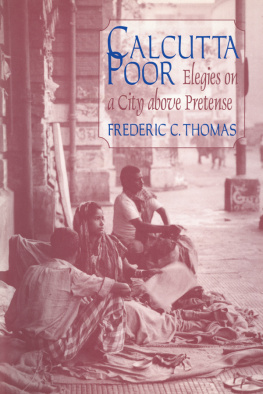

Published by Marion Street Press
4207 SE Woodstock Blvd # 168
Portland, OR 97206-6267
USA
http://www.marionstreetpress.com/
Orders and review copies: (800) 888-4741
Copyright 2012 by Kenan Heise
All rights reserved.
Printed in the United States of America
ISBN 978-1-936863-33-4
Jodie Levin-Epstein, Poverty Reduction: The Invisible Hand of Government (), The Huffington Post, 13 Sept. 2011. Reprinted with permission.
How Bad It Gets (), 9 Aug. 1981, Chicago Tribune. Reprinted with permission.
Neighbor Dialogue (), 12 Feb. 1982, 1982 Chicago Tribune. Reprinted with permission.
Neighborhood Dialogue (), 6 Nov. 1981, 1981 Chicago Tribune. Reprinted with permission.
Neighborhood Dialogue (), 8 Jan. 1982, 1982 Chicago Tribune. Reprinted with permission.
What They Had to Say (), 22 Sept. 1992, 1992 Chicago Tribune. Reprinted with permission.
Out-of-Work Steelworkers (), 26 Feb. 1982, 1982 Chicago Tribune. Reprinted with permission.
Neighborhood Dialogue (), 16 July 1982, 1982 Chicago Tribune. Reprinted with permission.
Dennis Sadowski, For U.S. Hispanics, poverty is growing faster with little relief in sight (. 2011 Catholic News Service/USCCB. Used with permission.
Angela Glover Blackwell, Race, Place, and Poverty (. Used with permission.
Tom Rodgers, Native Americans Who Are Poor (. Used with permission.
Senator Bernie Sanders, FOCUS: Is Poverty a Death Sentence? (), Reader Supported News, 14 September 2011. Reprinted with permission.
Natalie Moore, WBEZ, Trauma patients on South Side take more time to reach trauma centers (. Reprinted with permission.
Sarah Treuhaft, Angela Glover Blackwell, PolicyLink: Equity in Tomorrows America, (. Reprinted with permission.
Library of Congress Cataloging-in-Publication Data pending
Contents
FOREWORD
A homeless man, whoin composing thishas chosen to share with the reader the plight of his friends, a family of really nice people.
I hope people will read this book and come to know whats going on.
Friends of mine lived in the Uptown neighborhood of Chicago. They are really nice people. Theyve got two kids, but they use candleslots of thembecause they cannot afford electricity. They havent had any other lights in a long time.
I worry about it because of the children.
Several years ago, six small children living in Chicago just north of them died in a fire caused by candles. Several months earlier their electricity had been shut off and their parents were forced to use candles to light the apartment.
My friends told me the kids are used to burning candles and are careful, but I find it awfully scary.
The family couldnt use their refrigerator either. They traded the groceries they could buy with their Link Card for cash and used the money to pay the rent.
To get food, they mainly dumpster dived.
Nothing, nothing at all, is easy for them.
Now, they are gone. I do not know where or why. Ive asked neighbors and they didnt know either.
I know how it is. I was married and we had a kid. We never had enough food and we had to move often.
Cornelius M.
ACKNOWLEDGMENTS
I owe my deepest appreciation to the many individuals who offered hands, voices, comments, suggestions, corrections, encouragement, or support in producing this book.
The process of compiling it has been a joint venture of those persons living in poverty whose voices animate the book as well as so many people and organizations truly and energetically fighting poverty in our country and around the world.
Together, they tellin a new languagethe story of poverty. The book speaks specifics rather than generalizations, facts rather than conjectures and, more than anything else, about people and their lives.
Throughout The Book of the Poor, you will find hundreds of examples of this language along with a compelling narrative as we hear of
- a man in a store surreptitiously stuffing pigs ears and a beef tongue in his pocket and then begging a quarter from someone who had seen him do it,
- a woman who prays for those who help her and for those who dont want to,
- a mother on welfare who tells us whatya cuts down on first when the money stops coming in,
- real people and organizations all across this country determined to cut poverty in half within ten years or simply to end it, and
- 173,045,325 people around the world who have made a commitment to stand up against poverty.
I especially want to acknowledge those involved with the many organizations mentioned throughout the book. Their extraordinary generosity in behalf of this venture encourages me to say that any reader who contacts them in an effort to be of use will meet with a similar welcome.
The quality, even the adequacy of the writing and editing of the book, is due in enormous measure to the diligent efforts of my wife, Carol, and my brother, Joris. They had my back every page of the way. Help also came from Chris Thale, Tami Peden, and Bob Ford.
A special thanks goes to Marion Street Press and its owners, Jim Schuette and Kel Winter, who maintained a highly personal interest in the process and who have contributed the meaningful support every writer craves.
I also want to thank the Chicago Tribune, which time and again over the years afforded me the opportunity and encouragement to interview the poor and destitute and give them a chance to speak for themselves.
I have found Deborah Weinstein and the Coalition on Human Needs, of which she is the executive director, to be at the core of what is organizationally being done on behalf of the needs of the poor. She opened crucial doors in reaching others who are leading the fight against poverty throughout the country. In doing this, she contributed immeasurably to the helpful material you will encounter in the following pages.
I would like to acknowledge the support and generosity of Michael Katz and Robert Reich in allowing us to quote their material in a number of places throughout the book.
Finally, a special thanks to PolicyLink and to Spotlight on Poverty: The Source for News, Ideas and Action, an initiative managed by Center for Law and Social Policy (CLASP). The articles they have permitted us to reprint are simply superb in significance, content, and style.
I offer ahead of time a deep-felt gratitude to those who will embrace this work and help it to reach others.
INTRODUCTION
D eep within each of us burns a sparkacknowledged or notthat reminds us that poverty is a manifestly intolerable affront to humanity. Call it conscience or an awareness of our shared unalienable rights, but it tells us that:
- Poverty is hunger,
- Poverty is lack of shelter,
- Poverty is being sick and not able to see a doctor,
- Poverty is not knowing how to read,
- Poverty is not having a job,
- Poverty is fear for the future,
- Poverty is living one day at a time,
- Poverty is powerlessness,
- Poverty is lack of representation,
- Poverty is lack of freedom,
- Poverty is a situation people want to escape,
- Poverty is a call to action.
Though not a definition, this description begins to say what being poor means. It is borrowed from the website of A Minnesota Without Poverty (www.mnwithoutpoverty.org), one of the multitude of organizations across our nation bonding together to eliminate it.
Next page
